Second-term curse
The second-term curse is the perceived tendency of second terms of U.S. presidents to be less successful than their first terms.[1][2]
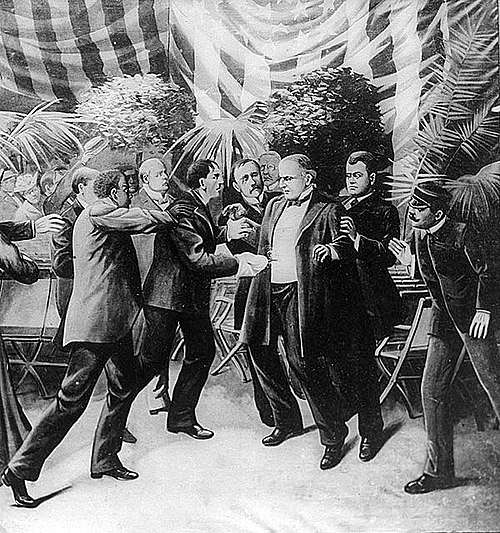
According to the "curse", the second terms of U.S. presidents have usually been plagued by a major scandal, policy inertia, some sort of catastrophe, or other problems.[3][4][5] There have been twenty-one U.S. presidents who have served a second term,[6] each of whom has faced difficulties attributed to the curse. The legend behind the second-term curse is that after Franklin D. Roosevelt broke the de facto second term limit by running for third and fourth terms, the ghost of George Washington might have put a curse on any president who seeks a second term.[4][5] This legend notwithstanding, several presidents who served prior to Roosevelt, including Washington himself, allegedly succumbed to the curse.[2]
Whether this perceived tendency is real is a subject of dispute: for example, political statistician Nate Silver, after analyzing presidential approval ratings for Harry S. Truman through Barack Obama, did find that approval ratings were lower on average during second terms, but he also found a variety of other reasons to explain those ratings, and he concluded that "the idea of the second-term curse is sloppy as an analytical concept".[7] In addition, political writer Michael Barone cited several presidents who had successful second terms, and wrote that "second-term problems resulted more often from the failure to adjust to changed circumstances and unanticipated challenges".[2] Conversely, a 2013 report in The Economist has said that the existence of the second-term curse is supported by data. The report stated that each of the eleven second terms served from the beginning of the Theodore Roosevelt administration to the end of the George W. Bush administration were less economically prosperous than their respective president's first term, save for the second terms of Truman, Ronald Reagan, and Bill Clinton.[8]
The worst curse of the second-term is the president's assassination. Abraham Lincoln and William McKinley were both assassinated in their second terms during 1865 and 1901, respectively.
Presidents of the curse
| President | Second term | Attributed event(s) | |
|---|---|---|---|
 |
George Washington | 1793–1797 | Ramifications of the French Revolutionary Wars[2] Controversy over his signing of the Jay Treaty[1] Fatigue due to political infighting[9] |
.jpg) |
Thomas Jefferson | 1805–1809 | Burr conspiracy[6] Embargo Act of 1807[2] |
 |
James Madison | 1813–1817 | Burning of Washington[2] |
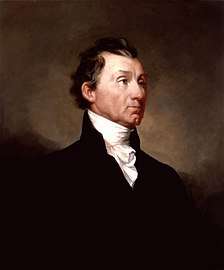 |
James Monroe | 1821–1825 | Congressional rejection of his anti-slavery efforts[6] |
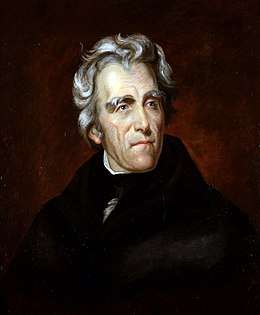 |
Andrew Jackson | 1833–1837 | Events in the Bank War which laid the groundwork for the Panic of 1837[10] |
 |
Abraham Lincoln | 1865 | His assassination[11] |
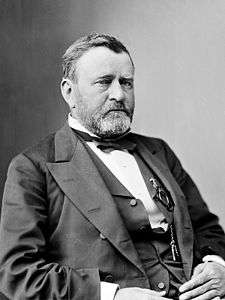 |
Ulysses S. Grant | 1873–1877 | Panic of 1873[6] Failure of his Reconstruction efforts to uphold the rights of Southern African-Americans[2] Numerous scandals[9] |
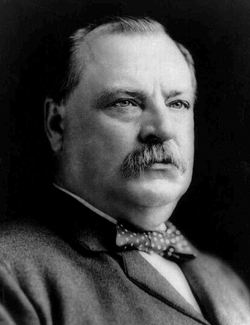 |
Grover Cleveland | 1893–1897 | Personal struggles with oral cancer[11] Panic of 1893[6] |
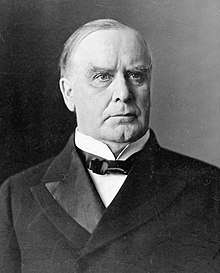 |
William McKinley | 1901 | His assassination[2] |
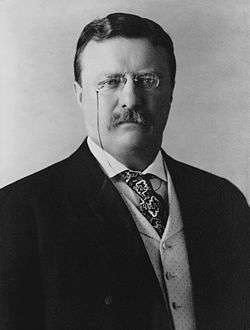 |
Theodore Roosevelt | 1905–1909[note 1] | The U.S. economy was not as strong as it was during his first term[8] |
 |
Woodrow Wilson | 1917–1921 | U.S. entry into World War I[2] Unpopularity stemming from his refusal to accept reservations to the Treaty of Versailles,[2] leading to the Senate's rejection of the treaty Failure to get the U.S. to join the League of Nations[9] Suffered a stroke[9] The U.S. economy was not as strong as it was during his first term[8] |
.jpg) |
Calvin Coolidge | 1925–1929[note 1] | The U.S. economy was not as strong as it was during his first term[8] |
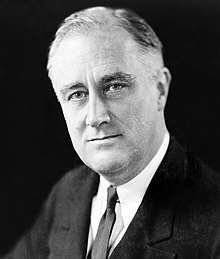 |
Franklin D. Roosevelt | 1937–1941 | Failure of the "court-packing plan"[1] The U.S. economy was not as strong as it was during his first term[8] |
 |
Harry S. Truman | 1949–1953[note 1] | Korean War[12] Controversy over his relief of General Douglas MacArthur[13] |
 |
Dwight D. Eisenhower | 1957–1961 | Overcoat scandal[1] 1960 U-2 incident[1][5] The U.S. economy was not as strong as it was during his first term[8] |
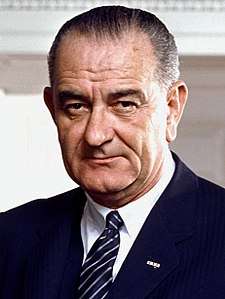 |
Lyndon B. Johnson | 1965–1969[note 1] | Vietnam War[12] Reaction to the Great Society[12] Urban riots and the Kerner Commission[12] Loss of Wisconsin primary to Eugene McCarthy[6] The U.S. economy was not as strong as it was during his first term[8] |
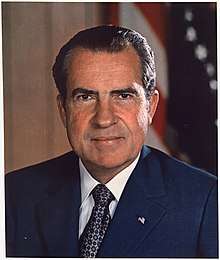 |
Richard Nixon | 1973–1974[note 2] | Watergate scandal and subsequent resignation[4][12] The U.S. economy was not as strong as it was during his first term[8] |
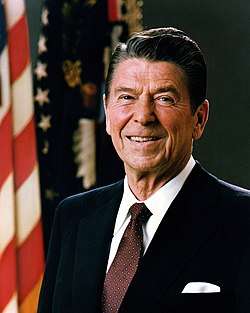 |
Ronald Reagan | 1985–1989 | Iran–Contra affair[1][4] |
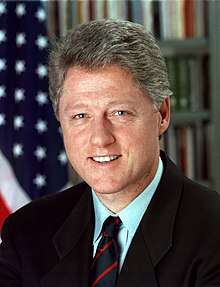 |
Bill Clinton | 1997–2001 | Paula Jones lawsuit[7] Lewinsky scandal and subsequent impeachment[1][4] Pardon controversy[14] |
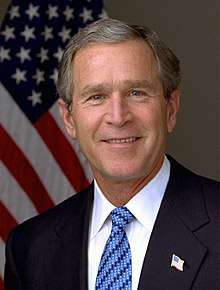 |
George W. Bush | 2005–2009 | Failure of Social Security reform[3] Hurricane Katrina[15] Indictment of Scooter Libby during the Plame affair[13] Financial crisis of 2007–2008[16] |
 |
Barack Obama | 2013–2017 | HealthCare.gov launch issues[17] Edward Snowden leaks[14] United States federal government shutdown of 2013[11] IRS targeting controversy[18] David Petraeus' guilty plea[17] Criticism over Obama's handling of Ebola virus cases in the United States[18] Numerous domestic terrorist attacks on U.S. soil, including the 2015 San Bernardino attack and the 2016 Orlando nightclub shooting[17][19] Low public support for his strategy against ISIL[17] |
See also
Notes
- Was serving his first full term after finishing out the term of his predecessor, who died in office.
- Became the first president to resign the office
References
- Clymer, Adam (November 7, 2012). "Triumphant Obama Faces New Foe in 'Second-Term Curse'". The New York Times. Retrieved November 9, 2012.
- Barone, Michael (January 20, 2013). "Unlucky (Lame) Ducks?". The Wall Street Journal. Retrieved December 5, 2016.
- Fournier, Ron (November 6, 2012). "5 Reasons Why Obama and Romney Will Get No Mandate". National Journal. Archived from the original on November 8, 2012. Retrieved November 9, 2012.
- Susan Page; Judy Keen (October 31, 2005). "Bush sets out to salvage 2nd term". USA Today. Retrieved July 23, 2017.
- Duberstein, Kenneth M. (October 29, 2005). "Breaking the second-term curse". Los Angeles Times. Retrieved November 9, 2012.
- Lehrman, Robert A. (January 19, 2013). "Obama's second term: What history says to expect". The Christian Science Monitor. Retrieved December 6, 2016.
- Silver, Nate (May 16, 2013). "Is There Really a Second-Term Curse?". The New York Times. Retrieved May 19, 2013.
My view, then, is that the idea of the second-term curse is sloppy as an analytical concept. There is certainly a historical tendency for presidents who earn a second term to become less popular — but some of this reflects reversion to the mean. And some recent presidents have overcome the supposed curse and actually become more popular on average during their second terms.
- "Second-term blues". The Economist. January 26, 2013. Retrieved December 6, 2016.
- Akhil Reed Amar (January–February 2013). "Second Chances". The Atlantic. Retrieved December 6, 2016.
- Henningsen, Vic (January 21, 2013). "Henningsen: Second Term Curse". Vermont Public Radio. Retrieved December 6, 2016.
- Cornwell, Rupert (November 2, 2013). "The curse of the second term hovers over hapless President Obama". The Independent. Retrieved December 5, 2016.
- Broder, David (January 20, 2005). "Fending Off the 'Second-Term Curse'". The Washington Post. Retrieved November 9, 2012.
- Hickey, Walt (February 18, 2013). "Watch Out, Obama: Second Terms Have Been Tainted By Scandal". Business Insider. Retrieved September 3, 2019.
- Hughes, Brian (July 19, 2014). "The 10 worst second-term moments for presidents since Richard Nixon". The Washington Examiner. Retrieved December 18, 2016.
- "Like Predecessors, Bush Has Second-Term Blues". The Wall Street Journal. October 29, 2005. Retrieved November 9, 2012.
- Kurtz, Howard (May 14, 2013). "Obama's second-term curse? Not so fast". CNN. Retrieved December 19, 2017.
- Harwood, John (January 6, 2016). "Avoiding the Dreaded 'Second-Term Curse'". The New York Times. Retrieved December 5, 2016.
- Pianin, Eric (October 22, 2014). "While Obama Skulks Around, Hillary Rides a Crest of Popularity". The Fiscal Times. Retrieved December 5, 2016.
- "A Complete List of Radical Islamic Terror Attacks on U.S. Soil Under Obama". Daily Wire. 2016-12-07. Retrieved 2017-01-30.